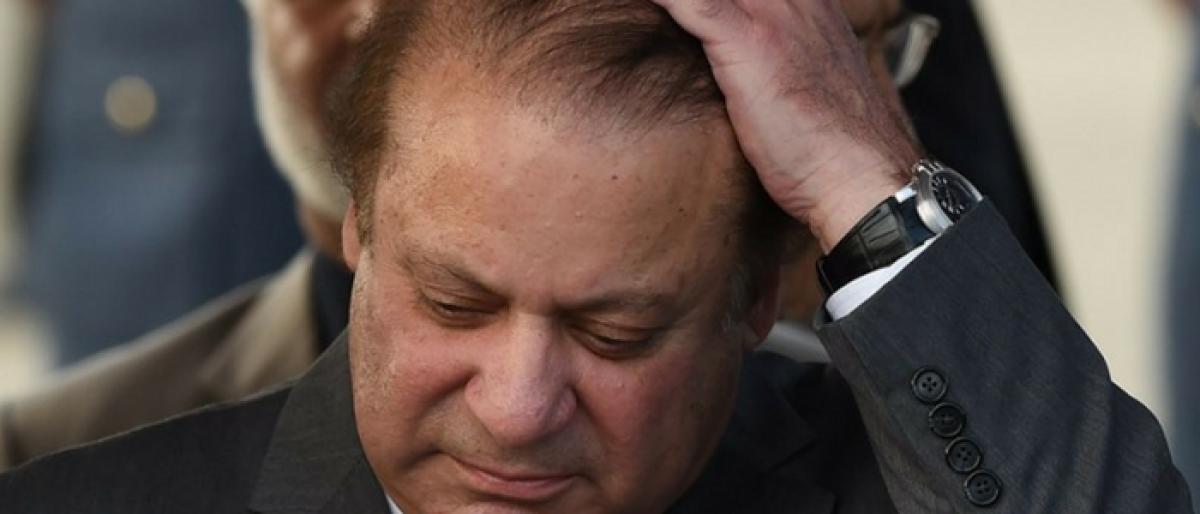Live
- First Impressions and Unboxing of the MacBook Pro M4: A Powerhouse for Professionals and Creators
- China Gears Up for Potential Trade War Amid Trump’s Tariff Threats
- Small Farmers Gain Less by Selling to Supermarkets: Study Reveals
- Why Despite the Controversy, America Is Anticipating the Mike Tyson vs. Jake Paul Fight
- Sanju Samson and Tilak Varma Shine: Record-Breaking Feats in 4th T20I Against South Africa
- India Urges $1.3 Trillion Annual Climate Support for Developing Nations
- Bad air: 106 shuttle buses, 60 extra Metro trips planned to make Delhiites give up cars
- WHO reports declining monkeypox cases in Congo
- CM Attends Kotideepotsavam on Kartika Purnima
- PKL Season 11: Raiding trio of Devank, Ayan, Sandeep help Patna Pirates rout Bengal Warriorz
Just In

Pakistan Prime Minister Nawaz Sharif’s stepping down owing to the Supreme Court verdict in a corruption case should normally augur well for a country that believes in the rule of law.
Pakistan Prime Minister Nawaz Sharif’s stepping down owing to the Supreme Court verdict in a corruption case should normally augur well for a country that believes in the rule of law.
But, the unpleasant history of the country’s polity negates any such expectation. Instead, the course of events in Islamabad indicates the fragility of Pakistan democracy.
Both India and Pakistan got independence at the same time. But, the experience of the two nations is poles apart. India emerges as a mature democracy despite deficiencies while its neighbour still struggles to remain democratic.
On the face of it, the developments may look like judicial activism checking executive corruption. But, not a single one of the 17 Prime Ministers who preceded Nawaz Sharif completed their full term in office.
Though the army, notorious for overthrowing the civilian regimes, denied any involvement in the latest developments, the Supreme Court's decision to include two members of the country's military intelligence agencies as part of the six-person JIT team fuelled rumours Pakistan's military had a hidden hand in the probe against Sharif.
On the contrary, Indian military never displayed any political ambitions and was always under the civilian control.
Pakistani democracy suffers from many deep-rooted malaises. The institutions have collapsed. Right from its inception, even as India embraced non-alignment, Islamabad has been avidly associated with some or other military block.
Jihadi elements have penetrated the Pakistani establishment turning the country into a breeding ground of global Islamic terror. Theocracy eclipses democracy. Minority rights were trampled upon. Export of terror to India became its foreign policy obsession. Constitutionalism was derailed.
The country has become a prisoner of ethnic conflict. Separatist movements threaten the unity and integrity of the country. Yet, the flawed nation refuses to refrain from meddling in the affairs of neighbouring country.
The rogue state is known for its nuclear hawkishness. Any uncertainty and chaos in this country is certainly a matter of concern for the world, especially India. The country has always been a pawn in the strategic games of powerful nations, pushing itself to a brink of disaster. Militarisation has huge social costs.
But, the Indian democracy has many defining features like multi-party democracy, periodic elections, peaceful transfer of power, separation of powers facilitating checks and balances, rule of law, independent judiciary, free media, military under civilian dispensation, constitutionalism guiding the democratic practice etc.
India only wishes a democratic, vibrant and prosperous neighbourhood. Despite being a strong nation, it never intended to interfere in the internal affairs of other countries. Pakistan should at least now realise that it is caught in the quagmire of anarchy and lawlessness.
The chaotic state should set its things right. The nation must introspect. It has to come out of the clutches of religious bigotry, military adventurism, political opportunism to emerge stronger. Instead of exporting terror to India, Pakistan should ‘import’ democracy form New Delhi.
When Pakistan can be so swift in concluding the investigations into Panama Papers, how can India, which swears by the promise of eliminating black money, lag behind? A transparent and fast-track investigation is needed to bring to book all those exposed by the Panama Papers.

© 2024 Hyderabad Media House Limited/The Hans India. All rights reserved. Powered by hocalwire.com







